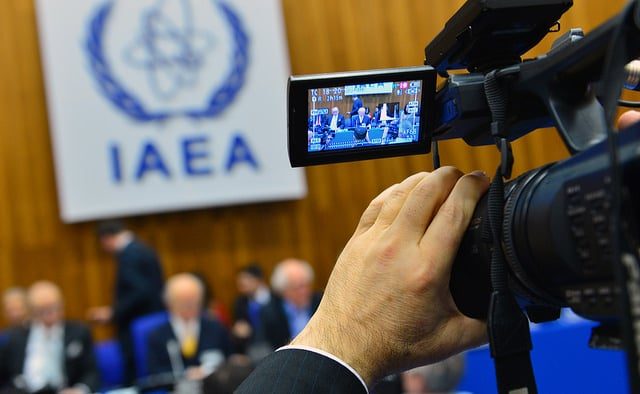Welcome to our roundup of news and current events related to ethics and international affairs! Here’s what we’ve been reading this month:
 Photo credit: IAEA Imagebank via Flickr.
Photo credit: IAEA Imagebank via Flickr.
The Atlantic: How Hassan Rouhani Won in Iran
Hassan Rouhani won reelection by a wide margin last week. Though he criticized his more conservative challengers for making false promises during the campaign, his own vows to lift social restrictions and to pursue the easing of non-nuclear sanctions against Iran will be difficult to achieve.
Read more on Iran, the international community, and the Joint Comprehensive Plan of Action in Ethics & International Affairs:
How Obama Solved U.S.-Iran Relations’ “Trolley Problem”
 Photo credit: Michel Temer via Flickr.
Photo credit: Michel Temer via Flickr.
Bloomberg: Chaos Takes Hold in Brazil as Markets Sink, Temer Vows to Fight
Just a year after the impeachment of Dilma Rousseff, Brazil is facing the possibility of losing another president to accusations of corruption. President Michel Temer, who is accused of paying hush-money to a politician linked to the Operation Carwash scandal, said he would not step down despite opposition calls for his impeachment.
Read more on resources, corruption, and Latin America in Ethics & International Affairs:
The Ethics of Supporting Regime Change
Populism and Democracy in Latin America
The Resource Curse and the Separation of Powers
 Photo credit: David A. Brandenburg via Flickr.
Photo credit: David A. Brandenburg via Flickr.
The Diplomat: China, ASEAN Come to Agreement on a Framework South China Sea Code of Conduct
China and ASEAN have agreed to a draft framework of the South China Sea Code of Conduct, which establishes regulations for use of the contentious area, prized for its utility for fishing, shipping, and strategic purposes. The Code of Conduct has been in progress since 2013 and the draft framework is a key development in maintaining peace in the region.
Read more on the South China Sea and international organizations in Asia in Ethics & International Affairs:
The Ethics of Avoiding Conflict with China
Western Pessimism, Asian Optimism: Three Perspectives on Global Governance
 Photo credit: Sebastien Wiertz via Flickr.
Photo credit: Sebastien Wiertz via Flickr.
Voice of America: Cyber Security Experts: Russia Disproportionately Targeted by Malware
The Russian Interior Ministry was the latest victim of the “Wanna Cry” virus, which has infected the British National Health Service, Spanish telecommunications company Telefonica, and the Russian company Megafon. The virus, a form of ransomware that charges victims a fee to recover their data, has infected over 75,000 computers globally.
Read more on cyberwar and technology in international relations in Ethics & International Affairs:
International Law and Cyberwar: A Response to The Ethics of Cyberweapons
Big Data and International Relations
 Photo credit: Christopher Michel via Flickr.
Photo credit: Christopher Michel via Flickr.
Al Jazeera: A Voyage to Antarctica
This interactive feature documents the work of the Swiss Polar Institute, which studies melting ice in Antarctica. The team’s mission is to explore how changes in Antarctica are affecting wildlife and whether or not climate change is the cause.
Read more on environmental stewardship in Ethics & International Affairs:
Arctic Stewardship: Maintaining Regional Resilience in an Era of Global Change
U.S. Senator Sheldon Whitehouse on Climate Change: A Test of American Leadership
Some Worries about Ecological-Humanitarian Intervention and Ecological Defense
 Photo credit: Ninara via Flickr.
Photo credit: Ninara via Flickr.
New York Times: Kenya’s Struggling Uber Drivers Fear a New Competitor: Uber
Uber is expanding rapidly in Africa, but so are its competitors. In an effort to win customers, the company is introducing a discounted service, worrying drivers who already struggle to make ends meet on low wages.
Read more on inequality, consumer responsibility, and standards in Ethics & International Affairs:
Consumer Responsibility and Obscurity
Eliminating Extreme Inequality: A Sustainable Development Goal, 2015–2030